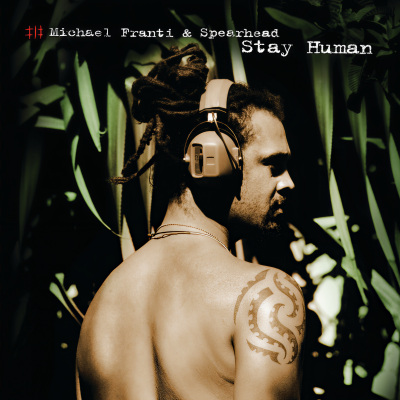
Stay Human
by Alan SeveraAn album of two levels: The level that makes the first impression is the radio phone-in show that Michael Franti chose to use as a conceptual framework in which these 13 new songs are embedded. The drama that unfolds during that radio show (supported by liner notes at the front of the CD booklet) centers on a death penalty case. The events documented in those segments sound all too familiar in their gruesomeness, so it becomes compelling to check the booklet to see if these are indeed authentic recordings of a broadcast or staged ones as part of the album's two-level concept (and only a short remark near the end of the booklet gives the answer to that). The impressive impact of that scenario is rounded off by quotes in the booklet from various activists and musicians who oppose the death penalty (with names ranging from Bono to Jello Biafra). The second level of the album provides a contrast to all that on a musical level -- the actual songs being predominantly based in the elegance of early-'70s soul music -- although Franti makes sure to get a resolute message across in the lyrics, and there are plenty of contemporary sound elements in the arrangements to keep this from becoming a purely "retro" album. However, both the styles and the lyrics do hark back to 30 years ago, when black music regularly sounded this elegant and lyrically aware. As it often was then, this album's message is essentially one of tolerance as the key to all kinds of solutions (as the title track, "Stay Human," puts it: "All the freaky people make the beauty of the world"), paired with militant resolve to spread that message, especially on songs like "Rock the Nation" and "Listener Supported. Most of the songs are actually pretty laid-back (underlining the anti-violence stance of the lyrics). That in itself would be nothing new for a Spearhead album, but the crisp production this time around (the best yet on a Spearhead album) steers clear of a certain dull monotony that weighed down the previous albums. The elegance and lightness of touch results in highlights such as "We Don't Mind" and "Do Ya Love." As usual with Spearhead, rapping remains just one of the parts of the musical picture, and indeed, after all the heavy-duty militancy that hip-hop brought to bear on black music in the past 20 years, hearing this album raises the question of how much has actually been achieved, when in 2001 a new album can feel contemporary although the sound and feelings expressed are very close to what they were like 30 years back. That possibly gives Franti a kind of outsider position, and some people might well deride this album's "hippy ideals," but it is a very valid and entertaining attempt at furthering social awareness on the strength of the most satisfying Spearhead songs yet.
